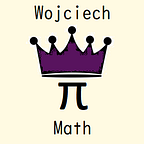A quick problem from the Oxford maths admission exam.
The problem is as follows.
Take log(x) to be log base 10 rather than base 2 in this question. Given that log(2) = 0.3010 to 4 decimal places and that 10^(0.2) <2, find the first digit of 2¹⁰⁰ and its length.
Please note that these admission exams are taken at the start of students’ final year of high school (17yrs) and thus they have no access to tools such as modular arithmetic. Before looking at the solution, give the problem a go!
.
.
.
We start off by looking at log(2¹⁰⁰). This is nothing but 100 log 2 by properties of the logarithm. By the question’s approximation, this is roughly 30.1. And thus 2¹⁰⁰ is roughly 10^(30.1). This helps us figure out how many digits it has; 31. This is because we can split it up into 10^(0.1)*10³⁰, and since 10^(0.1) must be only one digit, 10³⁰ defines all of our digits.
Next, we have that 10^(0.2) < 2, and thus we also have that 10^(0.1) < 2, meaning that the first digit of 2¹⁰⁰ also must be less than 2. The only possibility left is that it’s 1. Thus we have our final answer:
2¹⁰⁰ is 31 digits long and begins with 1.
